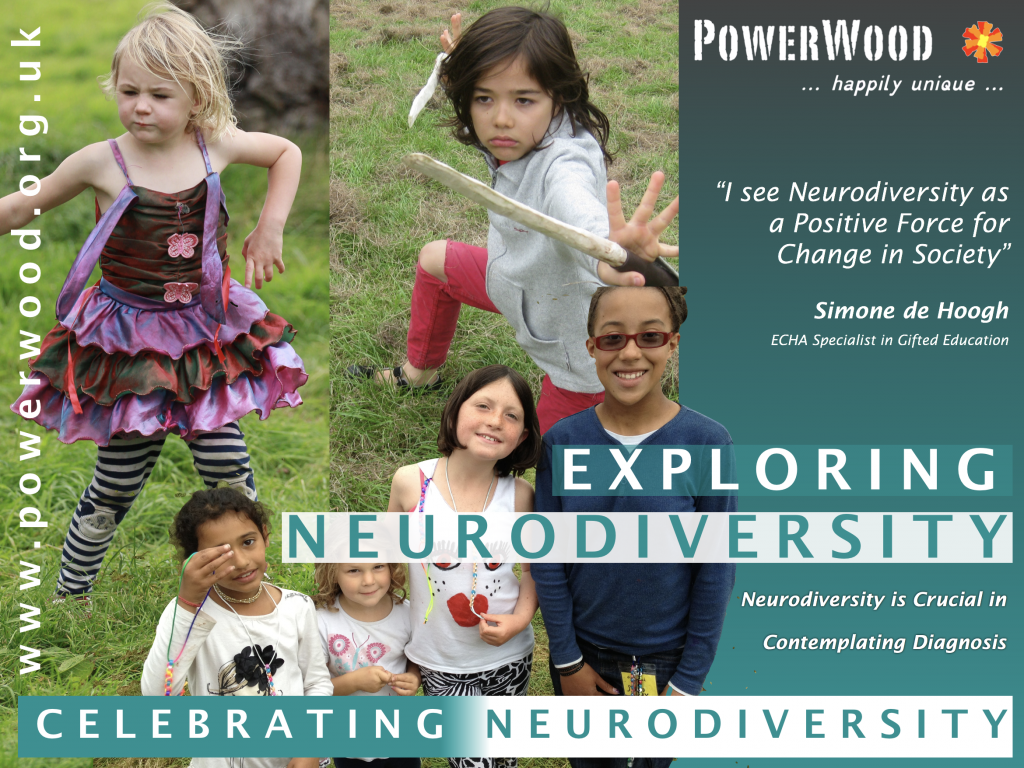Quite often intense, sensitive, over-excitable, more-able neurodiverse children have been referred by teachers or social services to a health care professional due to an assumption of a behavioural issue. Generally, they don’t assess his or her intellectual and creative abilities, and even if they do they often don’t take into account the consequences of being different from the norm, being neurodiverse, nor do they look at twice-exceptionality.
Differences are seen as Problems instead of Strengths
We parents prefer to be aware what kind of behaviour of an intense, sensitive, over-excitable, more-able child can be seen as a problem in itself by an educational or health care professional however it may have another explanation that requires a different measure to be able to improve the child’s or family’s well-being.

More Common Issues
Webb et al. (2005) have kindly given permission to replicate the following list of more common presenting complaints about more-able children in the hope that teachers, parents and professionals will become more knowledgeable about which behaviours should be considered with special care.
Often those behaviours lead health professionals to believe they deal with only a behavioural disorder. Those behaviours in the more-able neurodiverse should be treated as part of the whole person, in this case, the more-able person, of which the high-ability is often neglected and this neglect can be part of the cause of the problem. (Webb et al., 2005)
All the identified behaviours can be a problem in their own right. Intense, sensitive, over-excitable more-able children aren’t immune to emotional and behavioural disorders, but their behaviour should be thoroughly investigated before treatment.
The diagnosis must include knowledge of the environment and the individual because a mismatch between those two could lead to so-called ‘problem behaviour’. (Webb et al., 2005)
Frequent Referral Problems for Intense, Sensitive, Over-excitable More-able Neurodiverse Children
- He has a high activity level and low impulse control. I wonder if he has ADD/ADHD?
- This child is too serious for her age; she continually worries about moral, ethical, or philosophical questions. Is she depressed?
- He is always into things, taking things apart. Why can’t he leave things alone?
- For someone so bright, he has very little common sense. How can we teach him simple judgement?
- She is a perfectionist; she expects way too much of herself and others.
- She sleeps little, but she has extremely vivid dreams, sometimes even nightmares or night terrors.
- He’s a bed wetter and a sleepwalker.
- She’s so picky and sensitive. I have to cut the tags out of the backs of her shirts, and she complains that the fluorescent lights distract her at school.
- He seems too emotional; he gets intensely frustrated when he is unable to accomplish a goal, and he throws temper tantrums at such times. We walk on eggshells at home in order to avoid these meltdowns!
- He can’t seem to complete tasks or stay on track. His room and desk are disorganised and messy. He forgets to turn in work that we know he completed.
- She seems narcissistic and overly self-absorbed. Everything revolves around her.
- He has difficulty relating to peers. He wants to boss them around, and he doesn’t share interests of other kids his age. He’d rather spend time alone or with older kids or adults.
- She continually asks questions, interrupts others, and shows off her knowledge.
- He is way too sensitive and obsessed with fairness. He is in tears if he sees something horrible on the evening news. Is this normal for a child his age?
- The teacher tells me she’s bright, but she won’t do homework. She might fail her class even though she does well on tests.
- She constantly argues with us and defies us at every turn. She’s always looking for a way to outsmart us. We don’t know what to do.
- He completely lacks social skills and has no interest in reading anything except science fiction. I’m worried because he has no friends except two older boys in his science club. Someone suggested he might have Asperger’s Disorder.
- She’s angry and impatient; she just seems antisocial.
- He’s so advanced in some areas and not in others, and his handwriting is particularly poor. Does he have a learning disability?
- She’s a chronic daydreamer and loses everything we give her. Does she have a mental problem of some kind?
- He’s so moody and even explosive at times. It’s like he has two personalities. One minute he’s exuberant; a few minutes later he’s screamingly angry. Someone said he might have Bipolar Disorder.
- Her teacher believes my child has ADD/ADHD.
- From what I’ve read in magazines I am sure that my child has Bipolar Disorder or Asperger’s Disorder.
Frequent Referral Problems for Intense, Sensitive, Over-excitable More-able Neurodiverse Adults
- I have lost many jobs because I am more concerned with fairness than with making a profit.
- My spouse says I am too sensitive and too serious.
- I feel different from others; I just don’t enjoy socializing.
- My job evaluation says I am too impatient with others, and because of this, they don’t want to work with me.
- I feel duty-bound to challenge others’ thinking! Needless to say, they don’t like it when I do, and it’s causing social problems.
- I can’t seem to find anyone to date for a long-term relationship. There’s no one who shares my interests. I guess I’m just different.
- My spouse says that I am too involved in too many things to the neglect of the family. We’re wondering if I have a Manic-Depressive Disorder.
- My spouse says my intensity at work and at home is driving her crazy.
Further Reading
- SENG: When Your Child’s Exceptionality is Emotional: Looking Beyond Psychiatric Diagnosis
- You can buy Webb’s and his colleagues very clearly written, informative and practical book about Misdiagnosis and Dual diagnosis here. This book is a gem for every professional (and that means you too as a parent) dealing with intense, sensitive, over-excitable, more-able atypical children.
Exploring Neurodiversity – E-Book
FREE for Friend PowerWood Community members.
By Simone de Hoogh and other Active Contributors
PowerWood’s ‘Exploring Neurodiversity’ E-Book will give you insights in:
- What PowerWood’s stance is on Neurodiversity
- What the value is of Neurodiversity
- Why is it crucial in contemplating seeking a diagnosis
- What the positive sides are of being Neurodiverse
- Contemplating a diagnosis and what are the advantages and disadvantages
Emotion Regulation
Multilevel Emotion Regulation Theory (MERT) is a holistic theory developed by Simone de Hoogh. The theory explains how neurodiverse (young) individuals and parents of neurodiverse children can develop emotional regulation skills and direct their energy towards self-chosen goals, and contribute to society.
PowerWood’s Community
Find understanding, tools and strategies that work in an understanding, respectful and compassionate Community.
PowerWood can be your and your families advocate and your second family.
Explore how joining our PowerWood community by becoming a member will benefit you and your family and what types of memberships are available.
Join our Community
Available to Members*
*Booking a one-off Free Introductory Talk of 45-60 minutes by Skype or FaceTime with Senior Consultant Simone de Hoogh is one of the benefits of being either a FreeBee PowerWood Community Member or a Friend PowerWood Community Member.
Book a FREE Introductory Talk with a Professional*
You can read more about PowerWood’s Consultancy Sessions, the Benefits of a Free Introductory Talk and PowerWood’s Consultancy Services Tiered Fee Structure.
*Overexcitability Test
OE (Overexcitability) is an element of a Developmental Theory –Theory of Positive Disintegration by Dabrowski- that is one of the underpinning theories of MERT (Multi-level Emotion Regulation Theory) developed by Simone de Hoogh. Overexcitability explains and allows us to look at ‘extreme’ behaviour as a valuable asset in our or our children’s life.
Find out if you or your child has OE (OverExcitability) as well
*Boundary Test
A HUGE thank YOU to the son and daughter of Ernest Hartmann’s who gave PowerWood permission to use and put the full academically approved questionnaire about the Boundary in the Mind on PowerWood’s website.
Find out how the Boundary in the Mind affects you or your child

